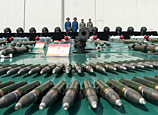
BEIJING, April 27 (Xinhua) -- Some investment gurus, if they can be called that, periodically express their pessimism about the Chinese economy and short sell Chinese stocks, but it turns out theirs is nothing but a game of crying wolf.
Their bearish tone has mostly proven to be a shortcut for securing handsome profits, with the so-called gurus scooping up bargains after their forecasts result in stocks getting dumped.
The latest episode involved Kynikos Associates founder Jim Chanos, a keen short-seller who has been bearish on China for years.
He recently warned, "There is a credit bubble that's actually not only huge but getting worse," saying China's real estate sector is plagued by asset inflation that does not generate enough cash to service the debt.
He dumped hefty Chinese financial and real estate stocks, inspiring the herd behavior that sent China's stock index plunging on Wednesday, Thursday and Friday.
However, this time, his words were not pure alarmism. China's economy is contending with a bumpy recovery, as 7.7-percent GDP growth in the first quarter fell short of expectations.
Investment, consumption and exports have grown at more tepid paces. Manufacturing activity has cooled for months, and credit and property bubbles could be time bombs if not properly contained.
Premier Li Keqiang recently said the economy will have to "climb hills and cross ridges," underlining the difficulties and challenges facing the world's second-largest economy, which has said goodbye to breakneck growth.
Nevertheless, it is unnecessary and premature to pile pessimism on the Chinese economy.
Credit bubbles loom large, but have been under tight oversight. At a special session convened Thursday by the Standing Committee of the Political Bureau of the Communist Party of China (CPC) Central Committee to review the country's economic situation, the country's top leaders underscored the need to guard against potential risks in financial sectors.
As part of the 4-trillion-yuan stimulus package that saved China from an economic meltdown in 2008, rampant growth in credit has triggered widespread concern, especially regarding mounting local government debt.
The debt has not ballooned in the way that foreign investment banks had forecast. Nevertheless, banking regulators have remained vigilant, telling commercial lenders to carefully monitor loans extended to local government financing vehicles.
Local government debts are protected and guaranteed by the central government, and this is the biggest reason why local governments are unlikely to default. If not with cash, their debts can be repaid through other means, such as asset restructuring.
 |
















 Heavy rain affects traffic in S China
Heavy rain affects traffic in S China


![]()
